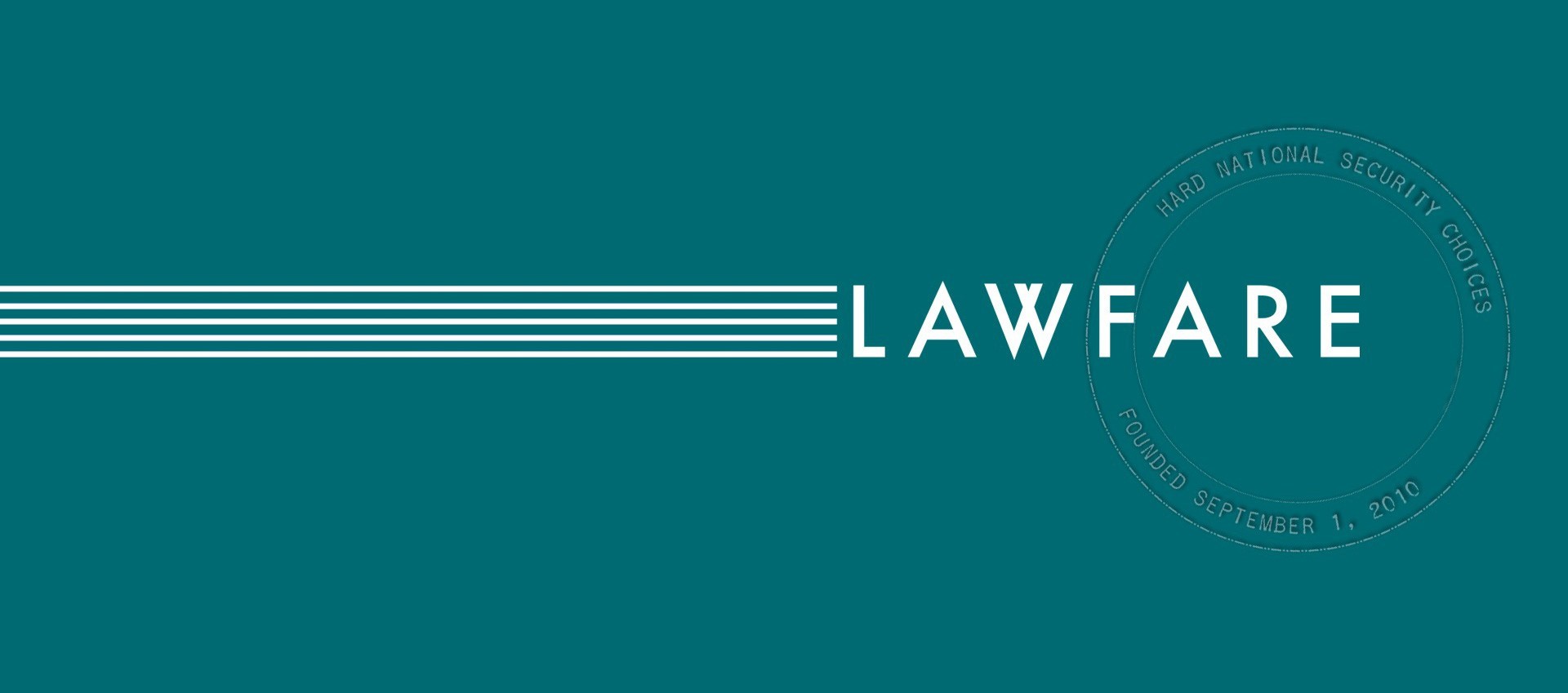Published by The Lawfare Institute
in Cooperation With

U.S. President Barack Obama delivered his final State of the Union to Congress last night, calling on the country to avoid succumbing to fear and to instead “face the future with confidence in who we are, what we stand for, and the incredible things we can do together.” The president also called for the closure of Guantanamo Bay, a new authorization for the use of military force against ISIS, the lifting of the Cuban embargo, and the passage of the Trans-Pacific Partnership. Obama presented the crises of the day as a question of “how to keep America safe and strong without either isolating ourselves or trying to nation-build everywhere there’s a problem.” With an eye on the national security sections of the speech, Lawfare provided a roundup of the most relevant sections.
You can read the full transcript here. The Republican response, delivered by South Carolina Governor Nikki Haley, is available here.
10 U.S. sailors were detained by Iran yesterday after, according to Iranian state media, their patrol vessels entered Iranian territorial waters near a major naval base. Both the Pentagon and the State Department initially said that one of the boats encountered mechanical problems as part of a routine mission and a statement from the Iranian Revolutionary Guard confirmed that “our technical investigations showed the two U.S. Navy boats entered Iranian territorial waters inadvertently.” However defense officials reported this morning after the boats were returned that they no longer believe mechanical problems caused the boats to veer into Iranian waters. Even so, the military apparently lost contact with both of the boats just before their seizure. In the New York Times, Thomas Erdbrink and Helene Cooper write that “Iran’s swift release of U.S. soldiers” is being “hailed as a sign of warmer relations.” Today, Iran released images of its sailors detaining and arresting the U.S. sailors. Another video shows a U.S. sailor apologizing for entering Iranian territorial waters, saying “it was a mistake that was our fault and we apologize for our mistake.” It is not clear whether the sailor was speaking voluntarily.
Yesterday, an ISIS suicide bomber rocked the tourist district of Istanbul, not far from the country’s renowned Blue Mosque, killing 10 tourists. In the Washington Post, Ishaan Tharoor explains “what the Islamic State gains from the Istanbul terror attack,” noting that the attacks killed nine Germans and may have aimed to spark more anti-refugee unrest in the European country. ISIS may also be warning Turkey against cracking down on the 60 mile long territory held by the group along the Turkish border.
In Defense One, Patrick Tucker shares that ISIS has built its own secure messaging app, which actually sounds like a pretty bad idea given what we know about other jihadist designed computer apps like Mujahideen Secrets.
In Afghanistan, the Islamic State claimed responsibility for a suicide attack on the Pakistani consulate in Jalalabad. According to Afghan officials, three attackers and seven members of the Afghan security forces died in the attack. Reuters notes that the attack on the Pakistani consulate comes just days after Pakistan hosted efforts to restart peace talks between the Taliban and Afghanistan.
A second attack, this time in Pakistan itself, killed at least 16 people today when a suicide bomber detonated his vest outside of a polio vaccination center in the city of Quetta. The New York Times reports that thirteen of the victims were police officers. The Pakistani Taliban claimed responsibility for the attack.
According to the Washington Post, “three Americans and a Belgian national are suing the government of Israel in U.S. federal court, seeking compensation for injuries suffered in a deadly 2010 confrontation between Israeli commandos and activists attempting to breach Israel’s naval blockade of the Gaza Strip.”
The New York Times reports that the Supreme Court heard arguments in Bank Markazi v. Peterson today, a case that examines whether Congress had the power to pass a 2012 law helping families of victims of terrorist attacks collect judgements against Iran. ScotusBlog has an argument analysis from the day’s proceedings.
Prior to President Barack Obama’s call to close Guantanamo Bay in the annual State of the Union address, Senate Majority Leader Mitch McConnell (R-KY) told reporters on Tuesday that he will fight the president’s plan to shutter the facility, calling it “the perfect place for terrorists.” McConnell said that he is a “big fan of using Gitmo the way it has been used.” The Guardian has more on McConnell’s comments.
Parting Shot: Do lawyers matter when it comes to national security policy? New York Times reporter Charlie Savage writes on the “eight things the Obama administration did not do because of legal concerns,” suggesting that attorneys haven’t been employed simply for “creative lawyering to get around an apparent obstacle.”
ICYMI: Yesterday, on Lawfare
Bobby alerted us to the Strauss Center’s Cybersecurity Conference on “Going Dark, Hacking Back, Botnet Takedowns, and More.” See Bobby’s post for the full agenda.
Jack wrote on his experience with the “feckless OPM” following the agency’s recent data breach.
Ben updated us on his application for Estonian digital residency, a slow moving but steady process.
Finally, Clara Spera summarized the proposed legislative reforms to the Uniform Code of Military Justice currently pending in Congress.
Email the Roundup Team noteworthy law and security-related articles to include, and follow us on Twitter and Facebook for additional commentary on these issues. Sign up to receive Lawfare in your inbox. Visit our Events Calendar to learn about upcoming national security events, and check out relevant job openings on our Job Board.





